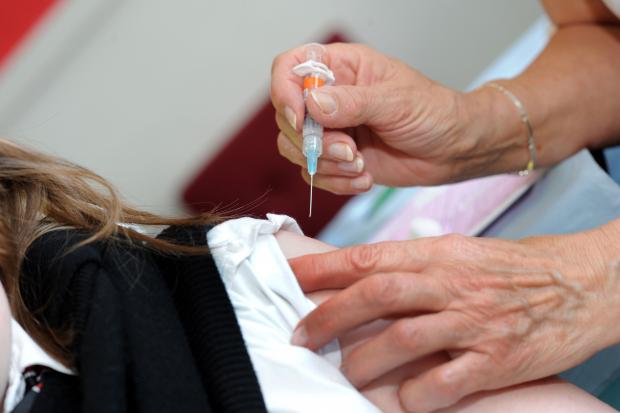Immunisation for teenagers between 14 and 18 years old
When you’re aged between 14 and 18, you get two vaccines against infectious diseases. You need these vaccines to complete your immunisation programme and give you long-term protection. You'll receive a booster vaccine against tetanus, diphtheria and polio. You will also receive a vaccine against four strains of meningococcal infection.
How a vaccine works
A vaccine has:
- a small part of the bacterium or virus that causes a disease
- small amounts of the chemical the bacterium produces
The vaccine stimulates your body’s immune system to fight infections and diseases. When you come into contact with the infection, your antibodies will recognise it and protect you.
When you might not get a vaccine
There are some reasons why immunisation might not be right for you.
It’s important to tell your GP or nurse about any illnesses or allergies you have had.
Before vaccination, the doctor or nurse needs to know if you:
- have a very high temperature, vomiting or diarrhoea on the day of the appointment
- have had convulsions or fits
- had a bad reaction to a previous immunisation
- are allergic to anything
- have a bleeding disorder
- have had treatment for cancer
- have an illness that affects the immune system, for example, leukaemia, HIV or AIDS
- take medicine that affects the immune system, for example, high dose steroids or treatments given after organ transplant or for cancers
- have any other serious illness
Knowing about your health helps the doctor or nurse choose the best immunisations.
A family history of illness doesn’t mean you cannot have a vaccination.
Getting the vaccines

You get both vaccines at the same time. Your school health department organises the vaccination programme for most young people aged between 14 and 18.
If you’re aged under 16, you will need your parent or guardian’s consent to get the vaccines at school.
Contact details for the school nursing teams in your area can be found at the following links:
- School vaccination team - Belfast Health and Social Care Trust
- School nursing service - Northern Health and Social Care Trust
- School nursing - South Eastern Health and Social Care Trust
- School nursing - Southern Health and Social Care Trust
- School nursing service - Western Health and Social Care Trust
If you’re aged between 16 and 18 and no longer at school, you should ask your GP about getting the vaccines.
Tetanus, diphtheria and polio (Td/IPV) vaccine
You get the vaccine in one injection to give you long-term protection against:
You should have received earlier vaccines against these diseases when you were a baby as part of the childhood immunisation programme.
Side effects of the Td/IPV vaccine
On your arm where you get the injection, you might have:
- swelling and redness
- a small, painless lump that usually disappears in a few weeks
On rare occasions, people may experience more serious side effects including:
- fever
- headache
- dizziness
- feeling sick
- swollen glands
Feeling unwell after vaccination
You can take paracetamol or ibuprofen if you feel unwell after vaccination. If necessary, take a second dose four to six hours later.
Contact your doctor if your temperature is still high after the second dose.
It’s important to tell your doctor about any health problem that could be linked to your immunisation.
If you’re aged under 16, you shouldn’t take aspirin or any medicine containing aspirin.
Meningococcal disease
Meningococcal disease (meningitis and/or blood poisoning (septicaemia is a life-threatening condition caused by meningococcal bacteria. The most common strains of the disease are:
- meningococcal group A
- meningococcal group B
- meningococcal group C
- meningococcal group W
- meningococcal group Y
Meningitis ACWY (MenACWY) vaccine
This vaccine protects against meningitis A, C, W and Y. You get the vaccine in one injection.
Side effects of the MenACWY vaccine
On your arm where you get the injection, you might have:
- swelling and redness
- a small, painless lump that usually disappears in a few weeks
On rare occasions, people may experience more serious side effects including:
- fever
- headache
- dizziness
- feeling sick
- swollen glands
Feeling unwell after vaccination
You can take paracetamol or ibuprofen if you feel unwell after vaccination. If necessary, take a second dose four to six hours later.
Contact your doctor if your temperature is still high after the second dose. It’s important to tell your doctor about any health problem that could be linked to your immunisation.
If you’re aged under 16, you shouldn’t take aspirin or any medicine containing aspirin.
MenACWY vaccination for teenagers and students
There is a separate vaccination programme for teenagers and students who didn’t get the MenACWY vaccine at school.
All young people born from 2 July 1996 and who have not yet received the MenACWY vaccine can request this from their GP up to the age of 25 years.
First year university students up to the age of 25 years can also request the vaccine from their GP. You should do this before starting university.
HPV vaccine
Young people aged 12 to 13 are offered the human papillomavirus (HPV) vaccine to protect them against HPV-related cancers including cervical cancer (in women) and other cancers of the anus, genitals, mouth and throat (in men and women).
Measles, Mumps and Rubella Vaccine (MMR) for teenagers
You should have received two doses of the MMR as a child, as part of the childhood immunisation programme.
If you didn't receive two doses of the MMR vaccine, the school health team will offer you the chance to have the MMR vaccine.
If you think you are not up-to-date with your MMR vaccines, speak to your GP or school nurse.